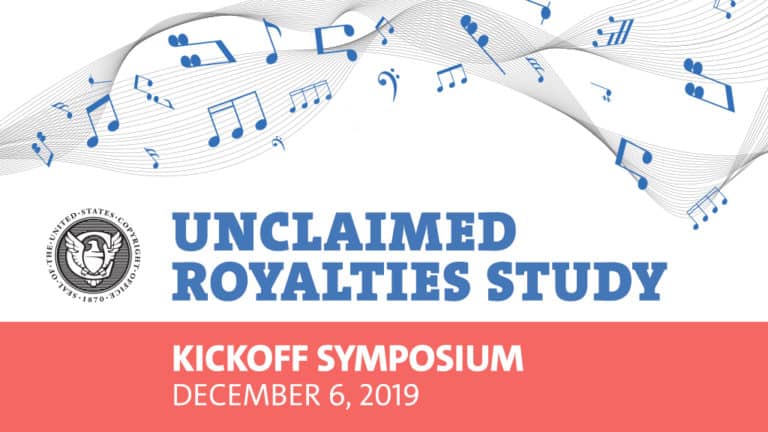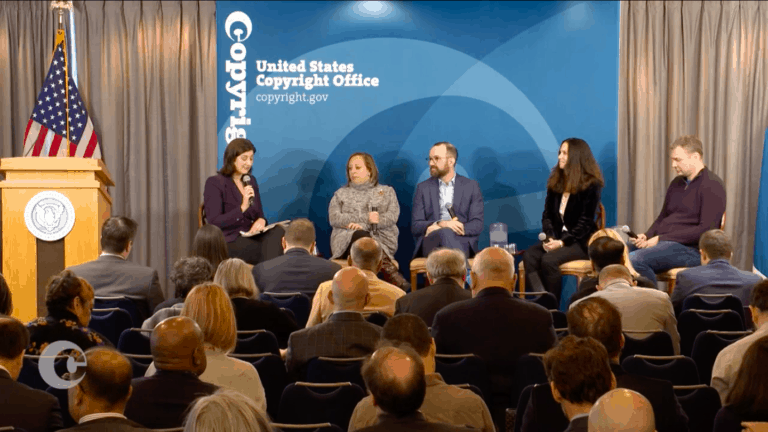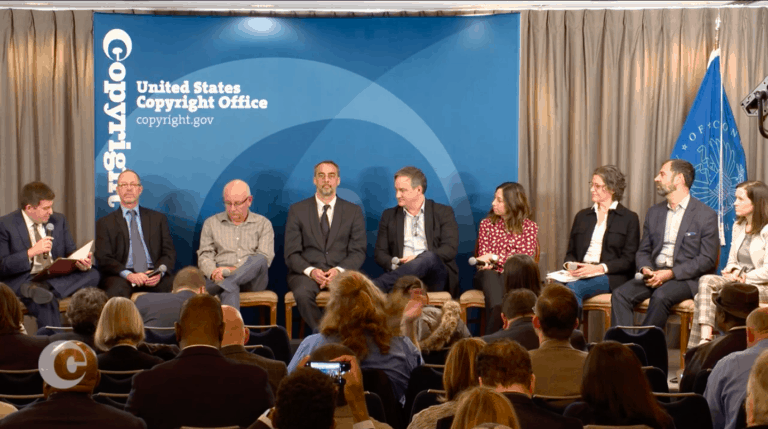On December 6, 2019, I attended the Unclaimed Royalties Study, Kickoff Symposium held in Washington, D.C. at the Copyright Office as a last-minute decision after learning that the Harry Fox Agency, alongside technology company ConsenSys, was the chosen partner to build the database of musical works and distribute royalties for the Music Licensing Collective (MLC) under the 2018 Music Modernization Act (MMA).
For some background, the MMA legislation has a process for organizing the approved leadership and getting that leadership to start the enormous task of forming a new blanket mechanical licensing organization for the collection and distribution of digital music royalties. The MLC will be the only organization in the United States responsible for ALL digital licensing of the Digital Service Providers, including, but not limited to, Spotify, Apple, Amazon, Google, and Tidal, effective January 1, 2021. That means the MLC has less than one year to create the largest and most accurate database of music publishing for the purpose of accurately licensing digital downloads and streams.
Though this is already being done in varying capacities by companies like HFA and Music Reports, no company has truly been able to identify the thousands of works with unidentified songwriters and publishers that are currently being streamed. To date, the money for these unidentified songs has been distributed by market share to the largest music publishers and amounts to roughly 20% of the works being used, meaning a significant portion of income is not finding its way to rights holders. These “black box” royalties are estimated to be worth somewhere in the region of $2.5 billion.
Before I kick off with the details of the symposium, please note that you can access all of the materials related to the event here, or go directly to the video recordings of the panels here.
The Symposium agenda
The Kickoff Symposium was divided into five panels that covered the following subjects:
- Update and Perspectives from the Mechanical Licensing Collective (“MLC”) and Digital Licensee Coordinator (“DLC”)
- Creating Comprehensive Databases – Past, Present and Future
- Artist Focus
- Matching Musical Works to Sound Recordings and Measuring Success; and
- Messaging to Creators.
A Question (not Answer) period followed, when participants pre-registered to ask questions that hopefully will be answered over the course of the next year during other panels that the Copyright Office will hold around the country.
The panels
The first panel, featuring MLC Board Chair Alisa Coleman and CIO Richard Thompson (formerly of DDEX) and the DLC’s Garrett Levin and Lisa Selden, gave a general overview of how the two organizations are working together. While no new information was shared, all parties were positive about their working relationship.
Next was the ‘Comprehensive Databases – Past, Present and Future’ panel that included discussions around former failed database projects. Interestingly, no publisher was on that panel, yet the moderator asked, “So what do you think of the BMI/ASCAP database resolution?” After some silence, Mark Isherwood of DDEX commented that he was unfamiliar with it, at which point the panel moderator, who works for the Copyright Office, asked, “Who can talk about this?” The panel deflected the question because they honestly didn’t know anything about the resolution as they work in different sectors of the industry, i.e., DDEX, RIAA, WIPO, OMI, and Sound Exchange. It was curious that the moderator thought that the panelists would know about a publishing industry matter that has not been well-publicized at all. Frankly, I don’t even believe many publishers could answer that question because there really hasn’t been any information distributed on the status of this much-needed music publishing split resolution process.
This was followed by an excellent artist perspectives panel moderated by industry consultant Erin McAnally which featured Roseanne Cash, Ivan Barias, and Alex Delicata. They discussed the problems with registration associated with the way that many songs are produced and written in stages now, that is, by sharing the writing and recording in multiple locations at different times. The panelists explained that this new model of production and writing is an impediment for resolving splits before a song is released. Plus, the PRO assigns the ISWC and that can’t happen until the song is registered at the PRO with the correct splits that are often negotiated and delayed by the complicated recording process. It creates a lag time. The panelists also implored the MLC and members of the audience in positions of influence to have an excellent educational plan for getting songwriters to correctly upload their works to the MLC, something I very much support and I hope the MLC heeds their advice.
The next panel, ‘Matching Musical Works to Sound Recordings and Measuring Success’, was the best by far. Its participants were Bill Colitre from MRI, John Raso from HFA, Ed Arrow from Universal Music Publishing, Jay Gress from Sony Music Entertainment, Terry Boissonneault from SOCAN/Dataclef, Vickie Nauman from CrossBorderWorks, Ali Lieberman from Sound Exchange, and Sarah Rosenbloom from Google. They discussed the complications with registration, getting an ISWC number in a timely manner, volume data, and many other important registration issues. It was a high-level, serious conversation. Bill Colitre made an impassioned presentation regarding how MRI is actually doing what the MLC needs to do for all the big DSPs right now.
The last panel was about reaching the writer community in the places they are located. Educational events at SXSW, having excellent phone support at the MLC head offices, and building a system of trust that will help spread the word that songwriters and smaller publishers must correctly upload their works to the MLC to get paid were all topics of discussion. The panelists also suggested great educational tools that would also be fun to use. For example, it was suggested that a clever way to teach the public about all the acronyms we use in the music business, e.g. HFA, ASCAP, BMI, PRO, CWR, IPI, ISWC, ISRC, and RIAA, would be to have someone like Pharrell Williams front a catchy song or presentation explaining them in simple terms.
As a publisher, I’m not really familiar with the DDEX acronyms and record industry professionals are probably not familiar with a lot of the music publishing acronyms. I would suggest that a glossary of terms should be posted on the Copyright Office and MLC websites. I was thinking that perhaps we could run a competition in the music community to encourage people to find fun and clever ways to teach artists and industry professionals key acronyms. It would help all of us get on the same page, regardless of our skill sets, if we could learn the language of each sector.
My questions
Next were the public questions. I asked three complicated and controversial questions. I admit that I was scared to do so, but I felt that it was important to put the questions out there to hopefully have the Copyright Office address the confusion and concern among many, particularly the independent and smaller stakeholders, including those who were unable to attend the Symposium.
Question 1: If you acknowledge that, on January 1, 2021, you are launching Version 1 of the MLC licensing solution and you are going to have a lot of money to distribute for claimed songs, which is the bulk of the royalties PLUS all of those unpaid NOIs that have been sitting in the Copyright Office for the past 2-3 years, why is there is not more than 3 years being given to sort out the unclaimed works before you throw them into an account that will largely get distributed to the majors, Kobalt and BMG, who own the biggest market share collectively?
Question 2: I’m confused as to how you are going to source the original MLC database. From Alisa Coleman’s comments it sounded like the plan is to take everyone’s CWR and upload that freshly, which would be great because copyright data is constantly being updated, but… Ed Arrow said the great thing about picking HFA as the royalty administrator is that their existing database will be used and just augmented with the newly written songs that are uploaded. Which is it? Is the HFA database going to be used as the source or will there be a completely new database?
Question 3: Matching Works – You accurately explained the complexities of getting the publishing data correct. How are HFA and ConsenSys going to improve on HFA’s current system? Under HFA’s current administration we have seen a $30 million-dollar settlement with the NMPA over Spotify and a $30 million-dollar class action lawsuit payment also in connection with Spotify, and Spotify was the only large DSP that HFA represented?
I recognize that the questions were controversial, but it’s my hope that we will get some clear answers soon. If you would like to contribute to the conversation, please write your comments to the Copyright Office.
Additionally, I’m seeing and hearing from colleagues outside the United States who want to get more involved. Here is the way you can connect. Follow this link to stay up to date with ongoing rulemaking at the Copyright Office. You can also submit comments here.
Lastly, if you are interested in signing up for the Copyright Office’s Newsnet service, to be alerted when they issue additional calls for comment or other announcements, head here to opt into their notifications.


